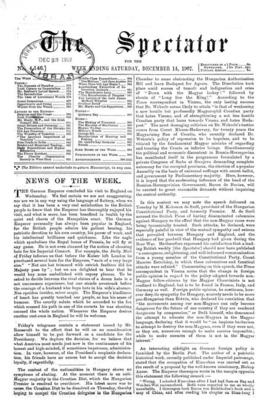In this context we may note the speech delivered on
Tuesday by M. Koloman de Szell, president of the Hungarian Constitutional Party, and formerly Premier. M. de Szell accused the British Press of having disseminated calumnies against Hungary to the effect that the non-Magyar races were being tyrannically treated. Such attacks, he declared, were especially painful in view of the mutual sympathy and esteem that prevailed between Hungary and England, and the evidence of her goodwill that Hungaiy had given during the Boer War. He therefore expressed his satisfaction that a lead- ing British weekly. [the Spectator] should now have published "a courageous, enlightening, and well-informed communication from a young member of the Constitutional Party, Count Mauriee Esterbizy, in which these calumnious and fanatical attacks were refuted." Commenting on this speech, the Times correspondent in Vienna notes that the change in foreign public opinion in regard to the policy adopted towards non- Magyar fellow-citizens by the Magyar Chauvinists is not confined to England, but is to be found in France, Italy, and Germany as well. Foreign public opinion, he continues, how- ever deep its sympathy for Hungary, scarcely needs to be more pro-Hungarian than Elatviis, who declared his conviction that "the movements among our non-Magyars can only become dangerous for the future of our country if they are rendered dangerous by compression," or Dezik himself, who denounced the attempt to educate the non-Magyars in the Magyar language, declaring that it would be "an impious barbarism to attempt to destroy the non-Magyars, even if they were not, as they are, numerous enough to make success impossible ; while to make enemies of them is not in the Magyar interest."


































































